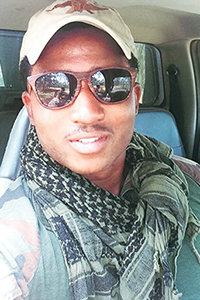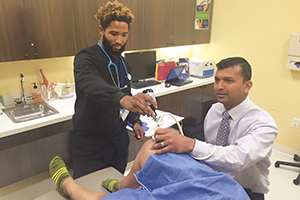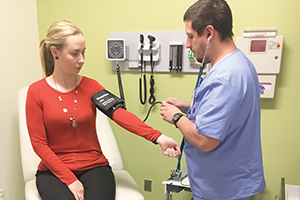Bon Secours Virginia is among health systems hiring vets as clinical care techs
By BETSY TAYLOR
As a U.S. Navy corpsman, James Tuppince provided medical care in high-pressure situations, sometimes roping from a helicopter or the top of a building to reach an injured Marine.

James Tuppince uses medical skills he acquired as a U.S. Navy corpsman in his civilian job as a clinical care technician with a Bon Secours Virginia physician's practice. Tuppince took this selfie while he served in Mexico with the Navy.
The nation's military trains Navy corpsmen, Army medics and Air Force medical technicians to provide first aid and assist in care for its sick and wounded, sometimes under extraordinarily challenging circumstances. But when these men and women transition from military service, their skills, aptitude and experience do not necessarily translate into ready employment in the civilian health care sector, because there are no corresponding roles for them.
Virginia has stepped up to make it easier for corpsmen, medics and military medical technicians to help bridge the employment gap while they burnish their civilian health care credentials. The state created the Military Medics and Corpsmen Program, as a type of clearinghouse that matches veterans with health care experience with potential jobs. Through the program, health care systems — including Bon Secours Virginia health system — are hiring service members with medical training as clinical care technicians, to support and assist with patient care. Bon Secours Virginia said its clinical care technicians earn wages comparable to licensed practical nurses.
Enabling legislation for the Military Medics and Corpsmen Program went into effect July 1, 2016. The overall scope of practice for clinical care technicians was determined by the General Assembly and Virginia Department of Health; health care systems can work within that scope and create job descriptions specific to their needs, according to Julie Selvey, director of nursing and education for Bon Secours Medical Group across Virginia.
Paul Junod, director of human resources for Bon Secours Virginia, said the 17 clinical care technicians hired by Bon Secours all work in ambulatory settings, and the next step will be to hire them for hospitals. "It's just been remarkable how well they've all done," he said.
In late April, Frederick Telles was a few weeks into his training as a clinical care technician for Bon Secours Virginia, in Mechanicsville, Va. A combat health care specialist in the Army, he is accustomed to working in a clinic setting too. He did that for about a year while at Fort Lee in Prince George County, Va.

Clinical Care Technician James Tuppince, left, assists Dr. Rishi Bala as he examines a patient at Bon Secours Sports Medicine and Primary Care in Richmond, Va. Tuppince learned health care skills while in the U.S. Navy and uses them at his civilian job.
A friend told him about the Military Medics and Corpsmen Program. Telles said the program addresses a pressing question of many in the military: "What do we have when we get out?"
Telles has been looking into returning to school to become a registered nurse. He said he's glad to have his job caring for patients. "I like that we get to do what we're trained to do," he said.
Employee pipeline
The Virginia Department of Veterans Services recruits and screens candidates for the jobs, said Mark Whiting, the veterans services department's lead program manager. It shares information from qualified applicants with health care systems, in part based on where in the state a candidate wants to work. Candidates then apply directly to the system where they want to be hired.
Bon Secours Virginia is one of six health care systems in Virginia to employ veterans as clinical care technicians. Whiting said a total of 37 veterans have been hired as clinical care technicians. Another 30 veterans have found other jobs with health care systems because of their contact with the Military Medics and Corpsmen Program. One veteran, for instance, took on a position as a security director, Whiting said.
Whiting said Louisiana has taken steps to begin a similar program.
Skill building
When Bon Secours Virginia facilities hire clinical care technicians through the program, the system assesses their skill level, and provides them with additional training or education as needed for their new roles, explained Selvey.

Army veteran Frederick Telles, right, takes a blood pressure reading on patient Megan Rodriguez at Bon Secours Memorial Regional Medical Center in Mechanicsville, Va., as part of his work as a clinical care technician.
Tuppince was the first clinical care technician hired by Bon Secours Virginia Medical Group; he works in a family practice office in the Bon Secours Richmond Health System. He heard about the program from a Virginia Department of Veterans Services official he met at a Christmas party in 2016, a few months after he finished his active duty. He applied to the program, interviewed with Bon Secours Richmond shortly thereafter and was working for the system by March of last year.
"It made my transition seamless, that's for sure," Tuppince said. Much of his work with the sick or wounded in the military involved episodic care. Bon Secours provided him with additional education about caring for patients with chronic conditions.
Showing hustle
Tuppince partners with a doctor or nurse practitioner each shift, taking vital signs, drawing blood, splinting and bracing injuries, administering breathing treatments. Tuppince said he's able to develop relationships with many of the patients.
He said one patient with post-traumatic stress disorder recently told him she usually feels nervous around male care providers, but Tuppince put her at ease. She thanked him for that and for making her comfortable returning for follow-up health appointments.
For his part, Tuppince is back in school, using his G.I. Bill education benefits to study to be a dietitian. He's started a wrestling club and a fitness business.
Copyright © 2018 by the Catholic Health Association
of the United States
For reprint permission, contact Betty Crosby or call (314) 253-3490.